- Home
- Alfred Bester
The Flowered Thundermug
The Flowered Thundermug Read online
Alfred Bester - The Flowered Thundermug
"We will conclude this first semester of Antiquities 107," Professor Paul Muni said, "with a reconstruction of an average day in the life of a mid-twentieth-century inhabitant of the United States of America, as Great L.A. was known five hundred years ago.
"Let us refer to him as Jukes, one of the proudest names of the times, immortalized in the Kallikak-Jukes-feud sagas. It is now generally agreed that the mysterious code letters JU, found in the directories of Hollywood East, or New York City as it was called then--viz., JU 6-0600 or JU 2-1914--indicate in some manner a genealogical relationship to the powerful Jukes dynasty.
"The year is 1950. Mr. Jukes, a typical `loner'--i.e., `bachelor'--lives on a small ranch outside New York. He rises at dawn, dresses in spurred boots, Daks slacks, rawhide shirt, gray flannel waistcoat and black knit tie. He arms himself with a Police Positive revolver or a Frontier Six Shooter and goes out to the Bar-B-Q to prepare his breakfast of curried plankton or converted algae. He may or may not surprise juvenile delinquents or red Indians on his ranch in the act of lynching a victim or rustling his automobiles, of which he has a herd of perhaps one hundred and fifty.
"These hooligans he disperses after single combat with his fists. Like all twentieth-century Americans, Jukes is a brute of fantastic strength, giving and receiving sledgehammer blows, or being battered by articles of furniture with inexhaustible resilience. He rarely uses his gun on such occasions; it is usually reserved for ceremonial rituals.
"Mr. Jukes journeys to his job in New York City on horseback; in a sports car (a kind of open automobile), or on an electric trolley car. He reads his morning newspaper, which will feature such stories as: `The Discovery of the North Pole,' `The Sinking of the Luxury Liner Titanic,' `The Successful Orbiting of Mars by Manned Space Capsule,' or `The Strange Death of President Harding.'
"Jukes works in an advertising agency situated on Madison Avenue (now Sunset Boulevard East), which, in those days, was a rough muddy highway, traversed by stagecoaches, lined with gin mills and populated by bullies, corpses and beautiful night-club performers in abbreviated dresses. Jukes is an agency man, dedicated to the guidance of taste, the improvement of culture, the election of public officers and the selection of national heroes.
"His office on the twentieth floor of a towering skyscraper is decorated in the characteristic style of the mid-twentieth century. He has a roll-top desk, a Null-G, or Free Fall chair and a brass spittoon. Illumination is by Optical Maser light pumps. Large fans suspended from the ceiling cool him in the summer, and an infrared Franklin stove warms him in the winter.
"The walls are decorated with rare pictures executed by such famous painters as Michelangelo, Renoir and Sunday. Alongside the desk is a tape recorder, which he uses for dictation. His words are later written down by a secretary using a pen and carbon ink. (It has, by now, been clearly demonstrated that the typewriting machine was not developed until the onset of the Computer Age at the end of the twentieth century.)
"Mr. Jukes's work involves the creation of the spiritual slogans that uplift the consumer half of the nation. A few of these have come down to us in more or less fragmentary condition, and those of you who have taken Professor Rex Harrison's course, Linguistics 916, know the extraordinary difficulties we are encountering in our attempts to interpret: `Good to the Last Drop' (for `good' read `God'?); `Does She or Doesn't She?' (what?); and `I Dreamed I Went to the Circus in My Maidenform Bra' (incomprehensible).
"At midday, Mr. Jukes takes a second meal, usually a community affair with thousands of others in a giant stadium. He returns to his office and resumes work, but you must understand that conditions were not ideal for concentration, which is why he was forced to labor as much as four and six hours a day. In those deplorable times there was a constant uproar of highway robberies, hijackings, gang wars and other brutalities. The air was filled with falling bodies as despairing brokers leaped from their office windows.
"Consequently it is only natural for Mr. Jukes to seek spiritual peace at the end of the day. This he finds at a ritual called a `cocktail party.' He and many other believers stand close-packed in a small room, praying aloud, and filling the air with the sacred residues of marijuana and mescaline. The women worshipers often wear vestments called `cocktail dresses,' otherwise known as `basic black.'
"Afterward, Mr. Jukes may take his last meal of the day in a night club, an underground place of entertainment where rare shows are presented. He is often accompanied by his `expense account,' a phrase difficult to interpret. Dr. David Niven argues most cogently that it was cant for `a woman of easy virtue,' but Professor Nelson Eddy points out that this merely compounds the difficulty, since no one today knows what `a woman of easy virtue' was.
"Finally, Mr. Jukes returns to his ranch on a `commuters' special,' a species of steam car, on which he plays games of chance with the professional gamblers who infested all the transportation systems of the times At home, he builds a small outdoor fire, calculates the day's expenses on his abacus, plays sad music on his guitar, makes love to one of the thousands of strange women who made it a practice of intruding on campfires at odd hours, rolls up in a blanket and goes to sleep.
"Such was the barbarism of that age--an age so hysteric that few men lived beyond one hundred years. And yet romantics today yearn for that monstrous era of turmoil and terror. Twentieth-century Americana is all the vogue. Only recently, a single copy of Life, a sort of mail-order catalogue, was bought at auction by the noted collector Clifton Webb for $150,000. I might mention, in passing, that in my analysis of that curio in the current Phil. Trans. I cast grave doubts on its authenticity. Certain anachronisms in the text indicate a possible forgery.
"And now a final word about your term examinations. There has been some talk about bias on the part of the computer. It has been suggested that when this department took over the Multi-III from Biochemistry, various circuits were overlooked and left operative, prejudicing the computer in favor of the mathematical approach. This is utter nonsense. Our computer psychiatrist assures me that the Multi-III was completely brainwashed and reindoctrinated. Exhaustive checks have shown that all errors were the result of student carelessness.
"I urge you to observe the standard sterilization procedures before taking your examination. Do not scamp your wash-up. Make sure your surgical caps, gowns, masks and gloves are properly adjusted. Be certain that your punching tools are in register and sterile. Remember that one speck of contamination on your answer card can wreck your results. The Multi-III is not a machine, it is a brain, and requires the same care and consideration you give your own bodies. Thank you, good luck, and I hope to see you all again next semester."
Coming out of the lecture hall, Professor Muni was met in the crowded corridor by his secretary, Ann Sothern. She was wearing a polka dot bikini, carried a tray of drinks and had a pair of the professor's swim trunks draped over her arm. Muni nodded in appreciation, swallowed a quick one and frowned at the traditional musical production number with which the students moved from class to class. He began reassembling his lecture notes as they hurried from the building.
"No time for a dip, Miss Sothern," he said. "I'm scheduled to sneer at a revolutionary discovery in the Medical Arts Building this afternoon."
"It's not on your calendar, Dr. Muni."
"I know. I know. But Raymond Massey is sick, and I'm standing in for him. Ray says he'll substitute for me the next time I'm due to advise a young genius to give up poetry."
They left the Sociology Building, passed the teardrop swimming pool, the book-shaped library, the heart-shaped Heart Clinic, and came to the faculty-shaped Faculty-Building. It was in a grove of royal palms through which a
miniature golf course meandered, its air conditioners emitting a sibilant sound. Inside the Faculty Building, concealed loudspeakers were broadcasting the latest noise-hit.
"What is it--Caruso's `Niagara'?" Professor Muni asked absently.
"No, Callas's `Johnstown Flood,'" Miss Sothern answered, opening the door of Muni's office. "Why, that's odd. I could have sworn I left the lights on." She felt for the light switch.
"Stop," Professor Muni snapped. "There's more here than meets the eye, Miss Sothern."
"You mean... ?"
"Who does one traditionally encounter on a surprise visit in a darkened room? I mean, whom."
"Th-the Bad Guys?"
"Precisely."
A nasal voice spoke. "You are so right, my dear professor, but I assure you this is purely a private business matter."
"Dr. Muni," Miss Sothern gasped. "There's someone in your office."
"Do come in, professor," the nasal voice said. "That is, if you will permit me to invite you into your own office. There is no use trying to turn on the lights, Miss Sothern. They have been--attended to."
"What is the meaning of this intrusion?" Professor Muni demanded.
"Come in. Come in. Boris, guide the professor to a chair. The goon who is taking your arm, Professor Muni, is my ruthless bodyguard, Boris Karloff. I am Peter Lorre."
"I demand an explanation," Muni shouted. "Why have you invaded my office? Why are the lights out? By what right do you--"
"The lights arc out because it is best that people do not see Boris. He is a most useful man, but not, shall we say, an aesthetic delight. Why I have invaded your office will be made known to you after you have answered one or two trifling questions."
"I will do nothing of the sort. Miss Sothern, get the dean."
"You will remain where you are, Miss Sothern."
"Do as you're told, Miss Sothern. I will not permit this--"
"Boris, light something."
Something was lit. Miss Sothern screamed. Professor Muni was dumb-struck.
"All right, Boris, put it out. Now, my dear professor, to business. First, let me inform you that it will be worth your while to answer my questions honestly. Be good enough to put out your hand." Professor Muni extended his hand. A sheaf of bills was placed in it. "Here is one thousand dollars; your consultation fee. Would you care to count it? Shall I have Boris light something?"
"I believe you," Muni muttered.
"Very good. Professor Muni, where and how long did you study American history?"
"That's an odd question, Mr. Lorre."
"You have been paid, Professor Muni."
"Very true. Well... I studied at Hollywood High, Harvard High, Yale High and the College of the Pacific."
"What is `college'?"
"The old name for a high. They're traditionalists at Pacific--hidebound reactionaries."
"And how long did you study?"
"Some twenty years."
"How long have you been teaching here at Columbia High?"
"Fifteen years."
"Then that adds up to thirty-five years of experience. Would you say that you had an extensive knowledge of the merits and qualifications of the various living historians?"
"Fairly extensive. Yes."
"Then who, in your opinion, is the leading authority on twentieth-century Americana?"
"Ah. So. Very interesting. Harrison, of course, on advertising copy, newspaper headlines, and photo captions. Taylor on domestic science--that's Dr. Elizabeth Taylor. Gable is probably your best bet for transportation. Clark's at Cambridge High now, but he--"
"Excuse me, Professor Muni. I put the question badly. I should have asked: Who is the leading authority on twentieth-century objects of virtu? Antiques, paintings, furniture, curios, objets d'art, and so forth..."
"Ah! I have no hesitation in answering that, Mr. Lorre. Myself."
"Very good. Very good. Now listen carefully, Professor Muni. I have been delegated by a little group of powerful men to hire your professional services. You will be paid ten thousand dollars in advance. You will give your word that the transaction will be kept secret. And it must be understood that if your mission fails, we will do nothing to help you."
"That's a lot of money," Professor Muni said slowly. "How can I be sure that this offer is from the Good Guys?"
"You have my assurance that it is for freedom and justice, the man on the street, the underdogs and the L.A. Way of Life. Of course, you can refuse this dangerous assignment, and it will not be held against you, but you are the one man in all Great L.A. who can carry it out."
"Well," Professor Muni said, "seeing that I have nothing better to do than mistakenly sneer at a cancer cure today, I might as well accept."
"I knew we could depend on you. You are the sort of little man that makes L.A. great. Boris, sing the national anthem."
"Thank you, but I need no praise. I'm just doing what any loyal, red-blooded, one-hundred-percent Angelino would do."
"Very good. I will pick you up at midnight. You will be wearing rough tweeds, a felt hat pulled down over your face and stout shoes. You will carry one hundred feet of mountaineering rope, prism binoculars and an ugly snub-nosed fission gun. Your code identity will be.369."
"This," Peter Lorre said, "is.369..369, may I have the pleasure of introducing you to X, Y and Z?"
"Good evening, Professor Muni," the Italian-looking gentleman said. "I am Vittorio De Sica. This is Miss Garbo. That is Edward Everett Horton. Thank you, Peter. You may go."
Mr. Lorre exited. Muni stared around. He was in a sumptuous penthouse apartment decorated entirely in white. Even the fire burning in the grate was, by some miracle of chemistry, composed entirely of milk-white flames. Mr. Horton was pacing nervously before the fire. Miss Garbo reclined languidly on a polar-bear skin, an ivory cigarette holder drooping from her hand.
"Let me relieve you of that rope, professor," De Sica said. "And the customary binoculars and snub-nosed pistol, I presume? I'll take them too. Do make yourself comfortable. You must forgive our being in faultless evening dress; our cover identities, you understand. We operate the gambling hell downstairs. Actually we are--"
"No!" Mr. Horton cried in alarm.
"Unless we have full faith in Professor Muni and are perfectly candid, we will get nowhere, my dear Horton. You agree, Greta?" Miss Garbo nodded.
"Actually," De Sica continued, "we are a little group of powerful art dealers."
Muni stammered, "Th-then... Then you're the De Sica, and the Garbo, and the Horton?"
"We are."
"B-but... But everyone says you don't exist. Everyone believes that the organization known as the Little Group of Powerful Art Dealers is really owned by `The Thirty-nine Steps,' with the controlling interest vested in Cosa Vostro. It is said that--"
"Yes, yes," De Sica interrupted. "That is what we desire to have believed; hence our cover identity as the sinister trio operating this gambling syndicate. But it is we three who control the art of the world, and that is why you are here."
"I don't understand."
"Show him the list," Miss Garbo growled.
De Sica produced a sheet of paper and handed it to Muni. "Be good enough to read this list of articles, Professor. Study it carefully. A great deal will depend on the conclusions you draw."
Automatic grill-waffler Steam-spray iron 12-speed electric mixer Automatic 6-cup percolator Electric aluminum fry pan 4-burner gas heater-range w. griddle 11-cubic-foot refrigerator plus 170-lb. freezer Power sweeper, canister-type, w. vinyl bumper Sewing machine w. bobbins and needles Maple-finished-pine wagon-wheel chandelier Opal-glass ceiling-fixture lamp Hobnail-glass provincial-style lamp Pull-down brass lamp w. beaded glass diffuser Double-bell black-faced alarm clock 50-piece service for 8, mirror-lite flatware 16-piece service for 4, Du Barry-pattern dinnerware All-nylon pile rug, 9x12, spice beige Colonial rug, oval, 9x12, fern green Hemp outdoor "Welcome" mat, 18x30 Sofa-bed and chair, sage green Round foam-rubber hassock Serofoam recliner ch
air w. 3-way mechanism Drop-leaf extension table, seats 8 4 captain's chairs w. scoop seats Colonial oak bachelor's chest, 3 drawers Colonial oak double dresser, 6 drawers French Provincial canopy bed, 54 in. wide
After studying the list for ten minutes, Professor Muni put the paper down and heaved a deep sigh. "It reads like the most fabulous buried treasure in history," he said.
"Oh, it is not buried, Professor."
Muni sat bolt upright. "You mean these objects actually exist?" he exclaimed.
"Most certainly they do. More of that later. First, have you absorbed the items?"
"Yes."
"You have them in your mind's eye?"
"I do."
"Then can you answer this question: Are these treasures all of a kind, of a style, of a taste?"
"You are obscure, Vittorio," Miss Garbo growled.

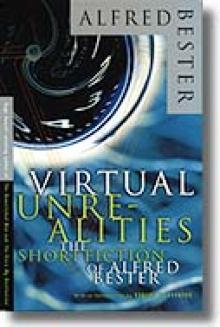 Galatea Galante
Galatea Galante Hobson’s Choice
Hobson’s Choice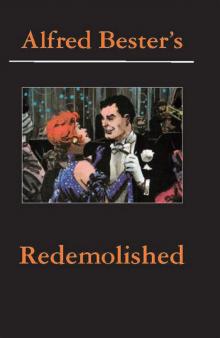 Redemolished
Redemolished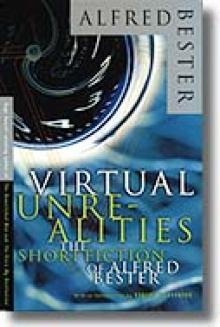 The Flowered Thundermug
The Flowered Thundermug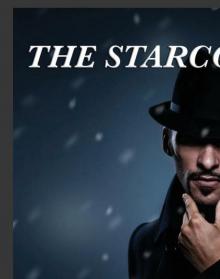 The Starcomber
The Starcomber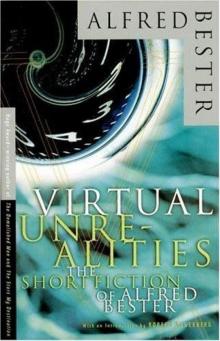 Virtual Unrealities: The Short Fiction of Alfred Bester
Virtual Unrealities: The Short Fiction of Alfred Bester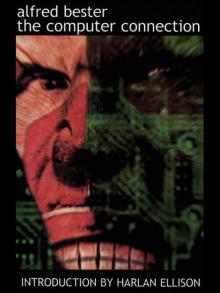 The Computer Connection
The Computer Connection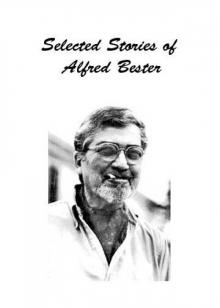 Selected Stories of Alfred Bester
Selected Stories of Alfred Bester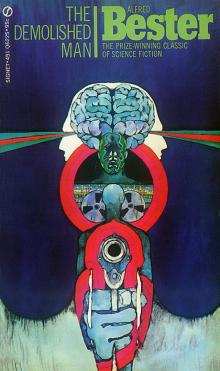 The Demolished Man
The Demolished Man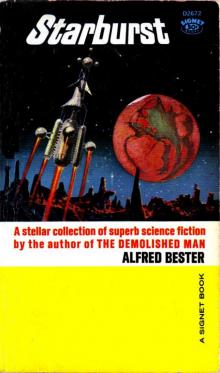 Starburst
Starburst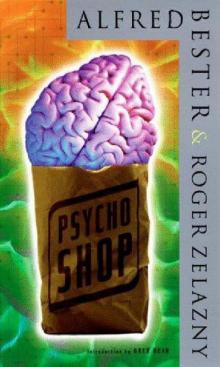 Psychoshop
Psychoshop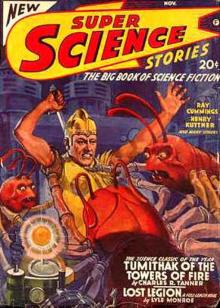 Biped Reegan
Biped Reegan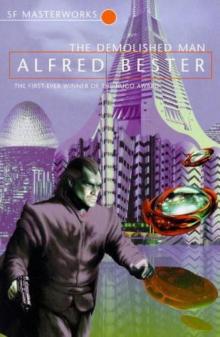 Demolished Man
Demolished Man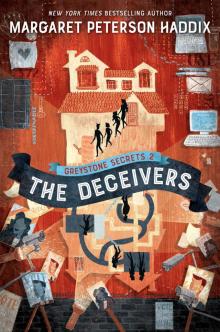 THE DECEIVERS
THE DECEIVERS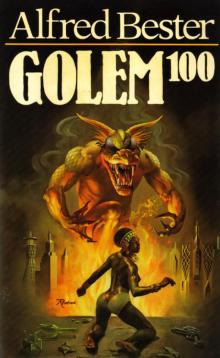 GOLEM 100
GOLEM 100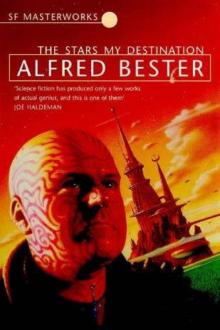 The Stars My Destination
The Stars My Destination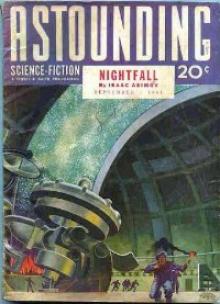 Adam And No Eve
Adam And No Eve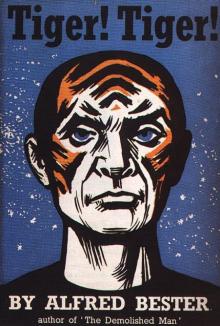 The Stars My Destination ( Tiger! Tiger! )
The Stars My Destination ( Tiger! Tiger! )